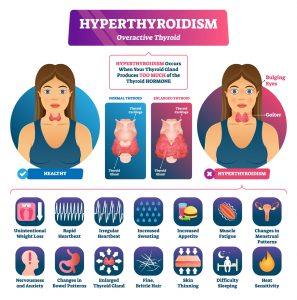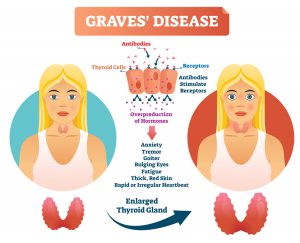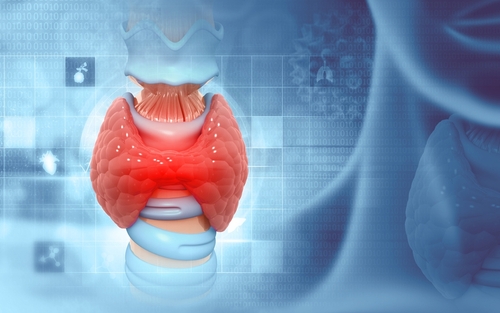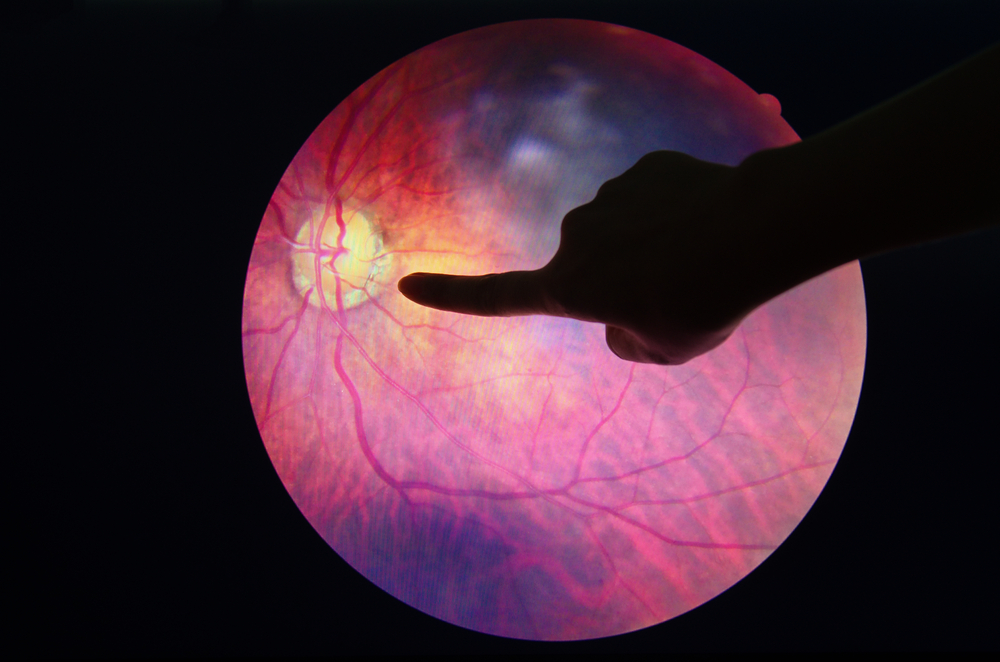WORDS DR KANG WAYE HANN
 FEATURED EXPERT FEATURED EXPERTDR KANG WAYE HANN Consultant Internal Medicine Physician and Endocrinologist Columbia Asia Hospital Puchong |
You are sitting at your work desk, but you can hardly get any work done properly. You struggle to curb the trembling in your fingers.
Sweat trickles down your back. You wonder why it feels this warm despite the air-conditioning blowing at maximum speed.
You swear that you felt a missing beat from the normal pace of your heartbeat. It just feels like there was just something weird with your heartbeat.
Your friends have been complimenting you about how much weight you have lost, but you have a voracious appetite and you keep eating.
Your mercurial mood swings have kept them and other people around you at a distance.
With all these going on, you just could not help thinking, are all these closely related to your scanty and irregular menses? Or is it part and parcel of that smooth neck swelling at your neck and your protruding eyes?
YOU’RE NOT GOING CRAZY—IT COULD BE YOUR THYROID GLAND
If you had experienced any of the symptoms mentioned above, you may have a condition known as hyperthyroidism or thyrotoxicosis.
This is a result of high levels of thyroid hormone, also known as thyroxine, circulating in your blood levels.

Sitting at the neck and resembling a butterfly, the thyroid gland secretes and stores thyroxine, the hormone that plays a vital role in maintaining your daily metabolism and other bodily functions.
Normally, the levels of the thyroxine hormone are kept in check by your body’s mechanism called homeostasis, with any alterations resulting in compensatory responses in your body.
When this mechanism fails, then the rising thyroxine hormone levels will eventually lead to the symptoms mentioned above.
THE MOST COMMON CAUSE OF HYPERTHYROIDISM IS A ‘GRAVE’ ONE
Graves’ disease is one of the most common causes of hyperthyroidism.

In this disease, the tyroxine stimulating hormone-receptor antibodies stimulate the thyroid gland to produce and release high levels of thyroxine into the blood levels.
People with Graves’ disease have smooth neck swelling often accompanied by protruding and swollen eyes as well as skin problems such as hives.
This affliction often plagues women within the reproductive age, especially if they have other autoimmune diseases or family members with autoimmune thyroid diseases.
TOXIC NODULES
Another cause of hyperthyroidism is the presence of thyroid tissue that independently and uncontrollably releases thyroid hormones into the blood stream.
Known as toxic nodules, this disease is more common in the older population, especially those with past history of iodine deficiency.
There can be just a single toxic nodule or multiple toxic nodules in the neck area, giving the appearance of an uneven neck swelling.
At times the neck swelling can be large enough to cause difficulties in swallowing or breathing.
OTHER POSSIBLE CAUSES OF HYPERTHYROIDISM
Other rarer causes include acute infection of the thyroid gland or side effects of certain medications.
IT IS IMPORTANT TO SEE A DOCTOR WHEN YOU THINK YOU HAVE HYPERTHYROIDISM
If left untreated, chronically high levels of thyroid hormones may result in irregular fast beating of the heart and subsequently heart failure.
This may also result in excessive bone mineral loss that can give rise to osteoporosis.
Sometimes, patients with hyperthyroidism may develop a severe life-threatening condition known as a thyroid storm if they are down with other acute medical condition such as a chest infection or heart attack.
A visit to the endocrinologist can be helpful if you think you may have hyperthyroidism, as sometimes the symptoms may be very vague in the early stages.
On top of a clinical assessment, a blood test is necessary to evaluate the thyroid function and confirm high levels of thyroid hormone in the blood.
Aside from that, further tests such as antibody level testing, ultrasound of the neck, or even a radioactive iodine scan are required to determine the exact cause of hyperthyroidism.
THE RIGHT MANAGEMENT PLAN CAN VARY ACCORDING TO THE DIFFERENT CAUSES OF HYPERTHYROIDISM
For instance, patients with Graves’ disease may recover after 18 months of medical treatment. However, patients with toxic nodules usually require life-long medications to control their thyroid hormone levels. In such cases, other options such as surgery and radioactive iodine therapy can be considered.







